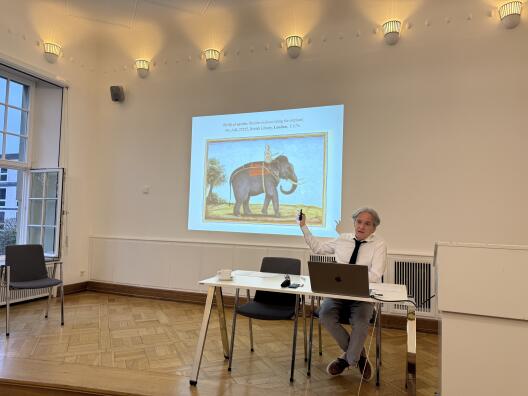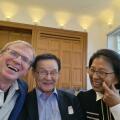Keynote speeches
PD Dr. Thoralf Klein, Loughborough University:
The Politics of Knowledge Transfer: Christian Missionaries and Chinese Society, 1830–1930
Thursday, 13 November 2025, 15:00-16:00
Knowledge transfer never occurs in a vacuum and is rarely, if ever, disinterested. In this paper, I examine how political factors influenced Christian missionaries’ in the production, dissemination and reception of knowledge in China and vice versa. I will place special emphasis on the relationship between religious and secular knowledge.
The paper follows a historical trajectory reaching from the eve of the Opium Wars to the aftermath of the Anti-Christian Movement of the 1920s. It distinguishes four periods: Before the First Opium War, some missionaries formed alliances with merchants and other secular actors to use the dissemination of Western knowledge in as well as the gathering of knowledge about China as a means of gaining a foothold in the inaccessible Qing Empire. Secular knowledge was thus placed at the service of religious knowledge. After 1842, information about China accumulated by missionaries was incorporated into what James Hevia has called the “imperial archive”, while roughly at the same time, Chinese scholar-officials used the services of missionaries, among others, to acquire knowledge that they considered useful in their attempts to strengthen China. Following the disaster of the Boxer War of 1900/01, the Qing government’s New Policy facilitated a partnership between Qing officials and social elites on the one hand and missionaries on the other to modernise Chinese society and culture. This union provided missionaries with an unprecedented opportunity to disseminate Christianity alongside secular knowledge. Finally, the anti-Christian agitation that emerged in the wake of the May Fourth Movement of 1919 drew a strict line between Western secular and religious knowledge, embracing the former but opposing the latter. The anti-Christian movement also attacked the missionaries’ role in the Chinese education system, not only calling the status of missionaries as providers of knowledge into question but also shaping government policy for much of the 1920s and early 1930s.
Prof. em. Cho Kwang, Korea University:
Woven Devotion: Korean Catholics and the Fabric of Social Transformation
Friday, 14 November 2025, 10:00-11:00
This keynote explores how Korean Catholics in the late 18th and early 19th centuries actively reinterpreted Christian teachings through indigenous ethical frameworks, exemplifying what scholars refer to as religious agency. Rather than passively accepting Western doctrines, Korean believers creatively integrated Christian theology with Confucian values, particularly the virtue of filial piety (孝).
A representative example of this intercultural reinterpretation is the way Korean Christians described God as 大君大父 (Great Lord and Great Father), thereby aligning divine authority with Confucian ideals of rulership and parenthood. Reverence for God was expressed not through abstract theological speculation but through deeply rooted ethical obligations, such as 大忠大孝 (Great Loyalty and Great Filial Piety). This conceptual shift anchored Christian devotion in the Korean moral imagination, enabling believers to articulate their faith through culturally resonant language and values.
This process of cultural translation extended beyond doctrinal reformulation and catalyzed a reimagining of the human person. Grounded in their reinterpretation of divine authority and ethical responsibility, Korean Christians came to emphasize values such as dignity, equality, justice, and communal solidarity—principles that directly challenged the rigid hierarchies and exclusionary norms of Joseon society. In this context, faith became a resource for moral critique and social transformation.
The Korean case demonstrates that intercultural knowledge transfer in religious contexts is not unidirectional but rather involves hybrid reinterpretations and negotiated meaning. It offers a compelling example of hybridity in which received doctrines are not merely blended but reconstituted through ethical and spiritual creativity into historically grounded visions of justice and humanity. This keynote argues that the Korean Christian experience holds broader relevance for comparative reflection on religious transformation and cultural agency across East Asia.
Prof. Dr. Fabrizio Speziale, EHESS Paris:
Islamic Genealogies of Indic Professions: Reconsidering Persian Pseudonymous Texts in South Asia
Saturday, 15 November 2025, 09:00-10:00
This lecture explores the production of Persian pseudonymous texts and Muslim genealogies as devices for the Islamization of scientific and technical knowledge assimilated from Indian society. It challenges the conventional philological and historical tendency to dismiss pseudonymous texts as minor or unreliable due to their lack of authentic authorship. Instead, it argues that Persian pseudonymous texts incorporating religious narratives are unique sources for understanding professional and economic transformations within South Asian Muslim society. The discussion focuses on two texts that employ contiguous textual strategies and narratives. The first, Haft aḥbāb (Seven friends), is a Persian treatise on Indian alchemy (rasaśāstra) attributed to a group of Sufis and a yogi who converted to Islam. It was written between 1537 and 1683, at a time when rasaśāstra preparations had become lucrative commodities in Indian society, prompting Muslim scholars to assert their expertise in these profitable procedures. The second text, Risāla-yi Kursī-nāma-yi Mahāwat-garī (Treatise on the Genealogical Tree of Mahout Practice), is an illustrated work on elephants and the mahout (elephant keeper), a profession assimilated by Muslims from the Indian environment. This treatise claimed a sacred genealogy for the profession, tracing its origins to the age of the Islamic prophets. The text gained significant readership during the Mughal period (1526–1857), when the mahout occupation became influential and economically rewarding due to its close association with royal power.
















